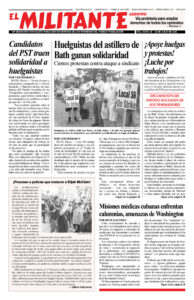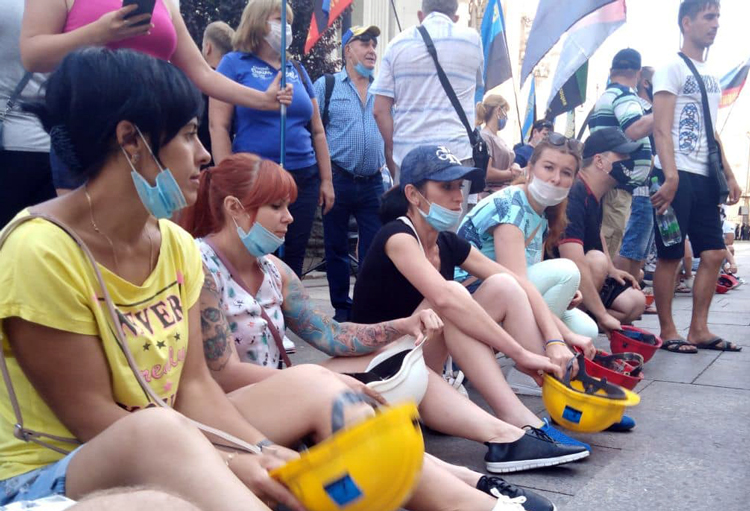Coal miners from across Ukraine have been organizing growing protests outside government offices in the capital Kyiv since June 30. Their main demand is for the government to pay what is owed them in back wages.
“There are workers who haven’t been paid for six months,” Nataliya Levytska told the Militant by phone July 6. She is deputy chair of the Independent Trade Unions of Miners of Ukraine and has been taking part in the daily protests.
Miners from the Lviv region in the west of the country occupied the square outside the president’s office for two days beginning June 22, demanding payment of back wages. President Volodymyr Zelensky met with them two days later and promised they would get paid. “Give me a couple of days, please,” he told them. “Go home to your families, I’ll figure it out.”
After another week of no pay the miners returned June 30 in bigger numbers and from more mines, both from the west and the east of Ukraine.
“We assembled at the Maidan and then marched downtown and rallied outside Zelensky’s office,” Levytska said. “We have been as many as 1,000 workers and we expect more joining in during the rest of this week.”
Maidan, the Independence Square, was the center for organizing the popular rebellion that led to the overthrow of the Moscow-backed government of Viktor Yanukovych in 2014.
Levytska said miners had tried to move in tents and supplies to set up an encampment in the square. They were stopped by the police, who confiscated their material. This led to a confrontation where cops roughed up union chair Mykhaylo Volynets when he told them they had no right to seize union property.
Protesters include both miners and workers in the coal processing plants, many of whom are women.
Another delegation of miners met with the deputy head of Zelensky’s office to press their demands.
“Our protest pressured the government to put some money into paying back wages, but they haven’t met our demands, so we continue,” said Levytska, who was part of the delegation. “Miners are outraged over how the cops and the government treat us.”
Shortly after the meeting, Prime Minister Denys Shmygal announced that $12.7 million had been allocated to pay wage arrears, boasting that “for the first time in a long time the state has no debt to the miners.”
The union disputes this, saying workers in state-owned mines are in fact owed $45 million, some of it dating back to 2018-19, and that there is no money in the state budget for June wages.
“They are trying to cover up the real debt to miners and hope it will be forgotten,” Levytska said. “Miners fear they will never get these wages and this adds further to their outrage.”
Miners are also demanding that coal imports from Russia and Belarus be prohibited and that the country’s power plants operate only on Ukrainian-mined coal. Ukraine — a country rich in coal deposits — has become a net importer. The miners demand state investment in equipment and in safety measures to stabilize and increase production and jobs.
There used to be 33 state-owned mines in Ukraine, today there are 14. A succession of governments have organized to sell off all the profitable mines to private owners — 85% of them to billionaire Rinat Akhmetov — leaving the other mines in state hands, losing money and subsidized by the state budget.
In the last 15 years production in the state-owned mines has decreased from 24 million tons a year to 4 million. This is due to the lack of modern equipment, meaning higher production costs and dangerous working conditions.
“Soon we’ll have to work like our grandfathers did — with sledgehammers!” one miner in eastern Ukraine told the press.
Many workers in Kyiv have visited the protest, asking miners what it’s about and what their demands are. Other unions have offered support.
“We hope our protest will serve as an example and will lead to miners getting their wages,” Levytska said. “One important thing is to get out information about what we are doing and why. That’s part of building support for the workers and putting pressure on the government.
“We’ll keep you informed of how the action continues and what results we get.”


